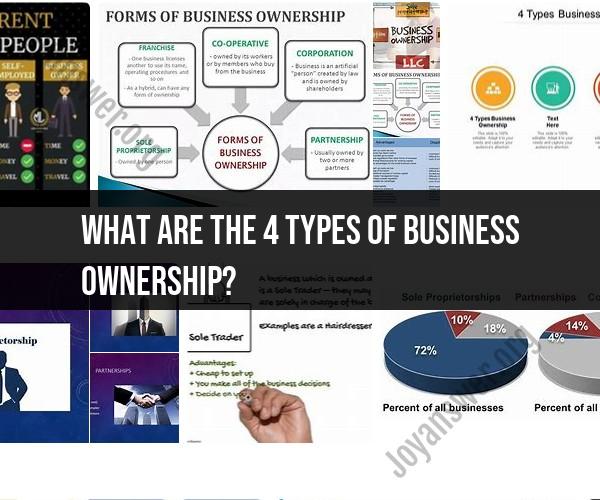What are the 4 types of business ownership?
The four primary types of business ownership are:
Sole Proprietorship:
- In a sole proprietorship, a single individual owns and operates the business.
- The owner has full control over business decisions and operations.
- The owner is personally liable for business debts and obligations, which means personal assets may be at risk.
- It's the simplest and most common form of business ownership, often found in small businesses.
Partnership:
- A partnership involves two or more individuals (partners) who share ownership, responsibilities, and profits in the business.
- Partnerships can be general partnerships, where all partners share equally in management and liability, or limited partnerships, where some partners have limited liability and may not be involved in day-to-day operations.
- Partnerships are based on a partnership agreement that outlines the roles, responsibilities, and profit-sharing arrangements.
Corporation:
- A corporation is a separate legal entity from its owners (shareholders).
- Shareholders own shares of the corporation's stock, and their liability is generally limited to the amount invested in the shares.
- Corporations have a more complex structure with a board of directors overseeing major decisions and officers managing daily operations.
- They offer greater access to capital through the sale of stock but involve more regulations and formalities.
Limited Liability Company (LLC):
- An LLC combines characteristics of both a corporation and a partnership.
- Owners are called members, and they have limited liability, protecting their personal assets.
- LLCs offer flexibility in management and taxation, as members can choose to be taxed as a partnership or a corporation.
- They are a popular choice for small and medium-sized businesses.
Each type of business ownership has its advantages and disadvantages in terms of liability, management, taxation, and access to capital. The choice of business structure depends on factors such as the size of the business, the number of owners, the nature of the industry, and the specific goals and needs of the business owners. It's important for entrepreneurs to carefully consider their options and possibly seek legal and financial advice when choosing a business ownership structure.
Exploring the Four Primary Types of Business Ownership
There are four primary types of business ownership: sole proprietorship, partnership, limited liability company (LLC), and corporation.
Sole proprietorship: A sole proprietorship is the simplest and most common type of business ownership. It is a business owned by one person. Sole proprietors have complete control over their business, but they are also personally liable for all business debts and liabilities.
Partnership: A partnership is a business owned by two or more people. Partners share in the profits and losses of the business, and they are all personally liable for business debts and liabilities.
Limited liability company (LLC): An LLC is a hybrid business structure that combines the features of a sole proprietorship and a corporation. LLC owners have limited liability, meaning that they are not personally liable for business debts and liabilities. LLCs also offer pass-through taxation, meaning that business profits and losses are passed through to the owners' personal tax returns.
Corporation: A corporation is a separate legal entity from its owners. Shareholders own a corporation and have limited liability, meaning that they are not personally liable for business debts and liabilities. Corporations are also taxed at the corporate level, meaning that the corporation pays taxes on its profits before any profits are distributed to shareholders.
Business Ownership Structures: Understanding Your Options
Each type of business ownership structure has its own advantages and disadvantages. It is important to choose the right ownership structure for your business based on your individual needs and circumstances.
Here is a brief overview of the pros and cons of each ownership type:
Sole proprietorship:
- Pros: Easy to set up and maintain, complete control over the business
- Cons: No limited liability, personally liable for business debts and liabilities
Partnership:
- Pros: Easy to set up and maintain, shared resources and expertise
- Cons: No limited liability, personally liable for business debts and liabilities
Limited liability company (LLC):
- Pros: Limited liability, pass-through taxation, flexibility
- Cons: More complex to set up and maintain than a sole proprietorship or partnership
Corporation:
- Pros: Limited liability, perpetual existence, easy to transfer ownership
- Cons: More complex to set up and maintain than other ownership types, double taxation
Choosing the Right Ownership Type for Your Business
When choosing the right ownership type for your business, it is important to consider the following factors:
- Personal liability: Do you want limited liability? If so, then an LLC or corporation is the right choice for you.
- Taxation: Do you want pass-through taxation? If so, then an LLC or sole proprietorship is the right choice for you.
- Flexibility: Do you need a flexible business structure? If so, then an LLC is the right choice for you.
- Complexity: How complex are you willing to make the business setup and maintenance process? If you want a simple business structure, then a sole proprietorship or partnership is the right choice for you.
It is also important to consult with an attorney or accountant to get professional advice on choosing the right ownership type for your business.










